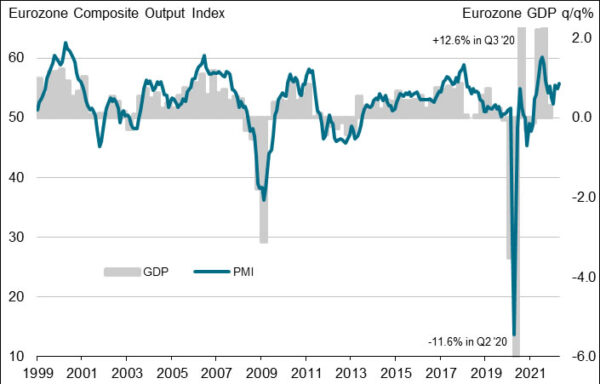Eurozone PMI Services was finalized at 57.7 in April, up from March’s 55.6, an 8-month high. PMI Composite was finalized at 55.8, up from March’s 54.9, a 7-month high.
Looking at some member states, France PMI composite was finalized at 57.6, a 51-month high. Spain rose to 55.7, 2-month high. Italy rose to 54.5, 4-month high. Germany, however, dropped to 54.3, 3-month low.
Chris Williamson, Chief Business Economist at S&P Global said:
“The eurozone economy has shown surprising resilience in the face of the Ukraine-Russia war, thanks to a renewed burst of service sector activity as virus containment measures were relaxed further during April. The survey data are consistent with GDP rising at a quarterly rate of around 0.7% at the start of the second quarter after signalling a 0.4% rise in the first quarter.
“Unfortunately the acceleration of output growth seen during the month was accompanied by a further surge in costs, which fed through to a record rise in average prices charged for goods and services.
“The combination of the stronger growth profile for the second quarter and a persistent acceleration of inflation signalled by the surveys will add to speculation that the ECB could start raising interest rates as soon as its July meeting.
“However, downside growth risks have increased, meaning policymakers could take a more cautious approach to tightening policy. Manufacturing growth has almost stalled, led by falling production in Germany, due to the new supply chain shocks and uncertainty caused by Russia’s invasion of Ukraine. It also remains unclear as to whether the service sector can sustain its current growth once the initial rebound from the reopening of the economy fades, especially given the soaring cost of living. Hopes of the economy being buoyed by pent-up demand may be confounded if spending power is eroded by inflation and risk aversion sets in, encouraging saving. The data flow as we head into the summer will therefore likely prove pivotal to policymakers in their assessment of whether the eurozone’s economic resilience can prove enduring.”
